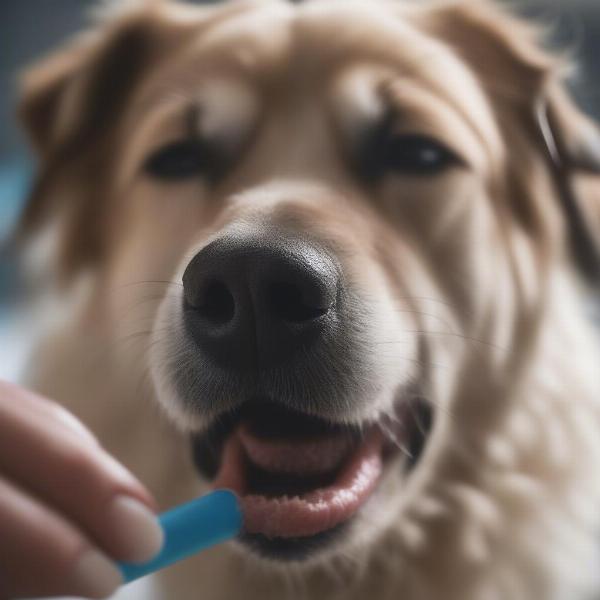Dog sneezing and coughing are common occurrences, but they can sometimes signal underlying health issues. Understanding the difference between a harmless sneeze and a concerning cough can help you provide the best care for your furry friend. This article will explore the various reasons why dogs sneeze and cough, when to seek veterinary attention, and how to keep your dog healthy.
Why Do Dogs Sneeze?
Sneezing in dogs, much like in humans, is a reflex action that helps clear the nasal passages of irritants such as dust, pollen, or foreign bodies. It’s often a short, sharp expulsion of air through the nose and mouth. While occasional sneezing is normal, frequent sneezing could indicate a problem.
- Allergies: Just like us, dogs can suffer from allergies to environmental factors like pollen, dust mites, mold, and certain foods. These allergies can cause inflammation in the nasal passages, leading to sneezing, runny nose, and itchy eyes.
- Infections: Viral or bacterial infections, such as kennel cough or canine influenza, can also cause sneezing, along with other symptoms like coughing, fever, and lethargy.
- Irritants: Strong smells, perfumes, cleaning products, cigarette smoke, and even dust can irritate a dog’s sensitive nose, triggering sneezing fits.
- Foreign Bodies: Sometimes, grass seeds, small toys, or other foreign objects can become lodged in a dog’s nose, causing irritation and sneezing.
- Excitement: Believe it or not, some dogs sneeze when they’re excited or playing, which is often accompanied by a playful bow and tail wags. This type of sneezing is generally harmless.
When to Worry About Dog Sneezing?
While occasional sneezing is usually nothing to worry about, you should consult a vet if your dog’s sneezing:
- Is persistent or chronic
- Is accompanied by other symptoms like coughing, discharge from the nose or eyes, loss of appetite, lethargy, or difficulty breathing
- Is accompanied by bleeding from the nose
- Seems to be causing your dog distress
Why Do Dogs Cough?
Coughing in dogs is a forceful expulsion of air from the lungs, often used to clear the airways of mucus, irritants, or foreign material. It can be a symptom of various conditions, ranging from mild to serious.
- Kennel Cough: This highly contagious respiratory infection is a common cause of coughing in dogs. It’s characterized by a harsh, dry, hacking cough, sometimes followed by a gagging sound.
- Heart Disease: Coughing, especially when lying down or at night, can be a sign of heart disease in dogs. Other symptoms may include difficulty breathing, exercise intolerance, and a bluish tint to the gums.
- Collapsing Trachea: This condition, common in small breed dogs, involves the weakening of the tracheal rings, leading to a distinctive honking cough.
- Asthma or Bronchitis: These respiratory conditions can cause inflammation and narrowing of the airways, resulting in coughing, wheezing, and difficulty breathing.
- Pneumonia: This serious lung infection can cause a wet, productive cough, along with fever, lethargy, and loss of appetite.
 Dog Coughing Due to Kennel Cough
Dog Coughing Due to Kennel Cough
When Should You Seek Veterinary Attention for a Coughing Dog?
It’s important to seek veterinary attention if your dog’s cough:
- Is persistent or worsening
- Is accompanied by other symptoms like difficulty breathing, fever, lethargy, loss of appetite, or weight loss
- Produces blood or discolored mucus
- Sounds like a honking goose
- Is interfering with your dog’s sleep or activity levels
Tips for Keeping Your Dog’s Respiratory System Healthy
- Vaccinations: Keep your dog’s vaccinations up-to-date, including the kennel cough vaccine.
- Parasite Prevention: Regularly administer heartworm preventative medication, as heartworms can cause respiratory problems.
- Avoid Irritants: Keep your home free of cigarette smoke, strong perfumes, and harsh cleaning products.
- Fresh Air and Exercise: Provide your dog with plenty of fresh air and regular exercise to support a healthy respiratory system.
- Healthy Diet: A balanced diet can boost your dog’s immune system and overall health.
Conclusion
Dog sneezing and coughing can be caused by a variety of factors. While occasional sneezing or coughing might be normal, persistent or severe symptoms warrant a visit to the veterinarian. By being observant and proactive, you can help ensure your dog’s respiratory health and overall well-being.
FAQ
- My dog sneezes a lot when we play. Is this normal? Yes, some dogs sneeze when they’re excited, which is often harmless. However, if the sneezing is excessive or accompanied by other symptoms, consult your vet.
- How can I tell if my dog’s cough is serious? If the cough is persistent, worsening, or accompanied by other symptoms like difficulty breathing, fever, or lethargy, seek veterinary attention.
- Can I give my dog human cough medicine? Never give your dog human medication without consulting your veterinarian. Some human medications are toxic to dogs.
- How can I prevent kennel cough? Vaccination is the best way to prevent kennel cough. Also, avoid exposing your dog to potentially infected dogs.
- What are the signs of allergies in dogs? Sneezing, itching, runny nose, watery eyes, and skin rashes can be signs of allergies in dogs.
- Is it normal for a dog to cough after drinking water? Occasional coughing after drinking water can be normal, especially if the dog drinks too quickly. However, frequent coughing after drinking could indicate a problem.
- How is collapsing trachea treated in dogs? Treatment for collapsing trachea can range from medication to manage symptoms to surgery in severe cases.
ILM Dog is a leading international dog care website dedicated to providing expert advice on all aspects of dog ownership. We offer valuable insights into dog breeds, health, training, nutrition, grooming, and much more. Whether you’re a new dog owner or a seasoned expert, ILM Dog is your go-to resource for reliable and practical information. For more helpful tips and expert advice, visit us at https://ilmdog.com or contact us at [email protected] or +44 20-3965-8624.